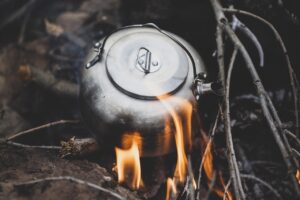What I Learned About Anger from Cooking
 Lessons about anger from cooking
Lessons about anger from cooking
There are so many things about life we can learn from cooking. Life is a paradox at times. For starters, practice makes perfect. The more you make a recipe, the better and easier it becomes. Doing it over and over helps us go from practice to perfection. The practice of dealing with anger helps us get it down better. The more we practice our responses, the better we become at controlling our anger.
Boiling vegetables makes them tender; boiling eggs makes the shell hard. We can allow our anger to make us tender, or make us hard. Don’t let anger harden your shell. I’m saddened at the many folks I see today who are “hardened” from anger. You can see it in the lines of their faces and hear it in their voices. Remember this lesson about the results of boiling eggs or vegetables.
How Anger Makes us Hard
The same goes with stovetop kettles. We use heat to bring water or food to a boil. We turn down the heat to make it simply simmer. To make the items in a kettle stop boiling, we remove it from heat.
There’s a rolling boil. That’s when you heat something high enough and long enough so that, even if you stir the pot, the boil continues. That’s called a rolling boil. Initially, when a kettle starts to boil, stirring the ingredients brings down the boil. However, letting the heat remain eventually guarantees a spilling of the contents or a rolling boil. Sometimes we try to “pacify” the anger in ourselves or in others instead of dealing with the root cause. That’s stirring a rolling boil. The only way to stop the boiling is to remove the heat.
That’s how it is with anger. We feed our anger the same way we boil water. We turn up the temperature and keep the kettle right on the heat. Instead of stirring the anger to get it to dissolve, we keep it going by keeping the heat on high until we allow it to boil over. Even when others try to dissuade us in our anger, we can keep rolling that boil. Boiling water burns! Not only does it burn, it can bring scars.
 Keeping the Heat on
Keeping the Heat on
This is how we keep the heat on.
- Continuing to think about the situation or the person whose behavior makes us mad.
- Thinking of ways to get even – and reiterating how he has wronged me.
- Talking to others about the person and the situation. Keeping the momentum going! Don’t stop. Just keep on the heat.
- Refusing to remove myself from the source (person) of anger. Continuing to fight back and stirring up emotions.
- Regurgitating the events again and again. Keeping the notebook open and contining to read the deeds of the other person.
- Focusing on keeping the heat on – Don’t take a break. Just keep stirring the anger.
How anger makes us tender
There’s another way to deal with anger; and that is to let it make us tender. As boiling water hardens eggs, it also softens vegetables, making them tender and delectable. This we learn from cooking. We recognize that the anger is there, but we allow the events and the situation to tender us instead of making us bitter.
These steps can help us:
- Focus on what God has done for us instead of on the person who has harmed us
- Recognize that our own faults make it difficult for folks to understand and love us – admit those faults
- Refuse to wallow in the pain from the anger or hurt of the other person. Get out of the boiling water!
- Recognize that God can use this situation to chip away at the rough edges of our character and shape us more into the image of Christ.
- Allow the pain to make us tender and more understanding of others.
- Use the pain to remind us to pray for the person who has harmed or wronged us.
cooking hands free
We choose how to respond to life and its situations. We choose to focus on the wrongs or focus on the blessings of God. It is also our choice to forgive and get rid of anger or to keep stirring the boiling pot. Turn off the heat. Remove the pot. That’s how you live hands free.






